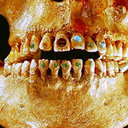Cheminformatics based selection and cytotoxic effects of herbal extracts.
Parole chiave
Astratto
Bioinformatics and traditional medicine can be used in discovery and design of novel candidate drugs to efficient cancer chemotherapy. In this study, similarity search tools employed to screen and introduce novel herbs with antitumor property. Several novel herbs have been selected by using logical computational algorithms and assayed on six cancerous cell lines. Complementary assays involved hemolytic and antifungal MIC tests have been performed to determine selectivity and their biocompatibility with RBC of herbal extracts. Final findings may point at selective activity of herbal extracts Rheum ribes, Ficus bengalensis, Morus alba, Musa sapientum, Arnebia decumbens, Citrus limon, Fraxinus excelsior, Rumex acetosella, Arnebia echioides in inducing cytotoxicity on cancerous cell lines. In the present research, in vitro results confirmed predicted findings from our in silico work. Complementary assays including antifungal MIC and hemolytic tests were carried out also to determine selectivity of herbal extracts. Findings resulted from hemolytic test showed that candidate herbal extracts did not induce hemolysis similar to negative control, also antifungal test results indicated that six herbal extracts had antifungal activity in concentration of 250 microg/ml.


